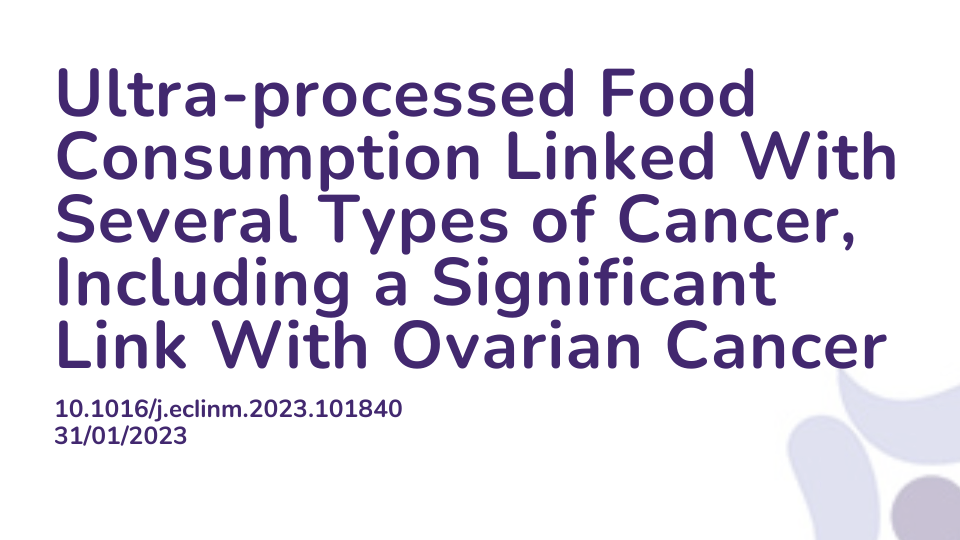Summary:
Ultra-processed foods (UPF) are commonly consumed in many countries and are primarily made up of nutrient void and highly manufactured food such as biscuits, processed meats, packaged cereals etc. This paper examines whether there is an association between UPFs and 34 types of cancer. The study looked at a cohort of almost 200,000 patients aged between 40-69 years who provided a complete dietary recall for three years. The average number of UPFs consumed amongst the group was roughly 23% of their total diet. Of the group, 15,921 individuals developed cancer and 4009 of those patients died from cancer. The results showed that as UPF consumption increased, so did incidence of cancer, especially ovarian cancer. In summary, this prospective cohort study suggests that a higher UPF consumption may be associated with increased cancer diagnosis, especially ovarian cancer and potentially a fatal condition.
Abstract:
Background: Global dietary patterns are increasingly dominated by relatively cheap, highly palatable, and ready-to-eat ultra-processed foods (UPFs). However, prospective evidence is limited on cancer development and mortality in relation to UPF consumption. This study examines associations between UPF consumption and risk of cancer and associated mortality for 34 site-specific cancers in a large cohort of British adults. Methods: This study included a prospective cohort of UK Biobank participants (aged 40–69 years) who completed 24-h dietary recalls between 2009 and 2012 (N = 197426, 54.6% women) and were followed up until Jan 31, 2021. Food items consumed were categorised according to their degree of food processing using the NOVA food classification system. Individuals’ UPF consumption was expressed as a percentage of total food intake (g/day). Prospective associations were assessed using multivariable Cox proportional hazards models adjusted for baseline socio-demographic characteristics, smoking status, physical activity, body mass index, alcohol and total energy intake. Findings: The mean UPF consumption was 22.9% (SD 13.3%) in the total diet. During a median follow-up time of 9.8 years, 15,921 individuals developed cancer and 4009 cancer-related deaths occurred. Every 10 percentage points increment in UPF consumption was associated with an increased incidence of overall (hazard ratio, 1.02; 95% CI, 1.01–1.04) and specifically ovarian (1.19; 1.08–1.30) cancer. Furthermore, every 10 percentage points increment in UPF consumption was associated with an increased risk of overall (1.06; 1.03–1.09), ovarian (1.30; 1.13–1.50), and breast (1.16; 1.02–1.32) cancer-related mortality. Interpretation: Our UK-based cohort study suggests that higher UPF consumption may be linked to an increased burden and mortality for overall and certain site-specific cancers especially ovarian cancer in women.
Article Publication Date: 31/01/2023
DOI: 10.1016/j.eclinm.2023.101840



